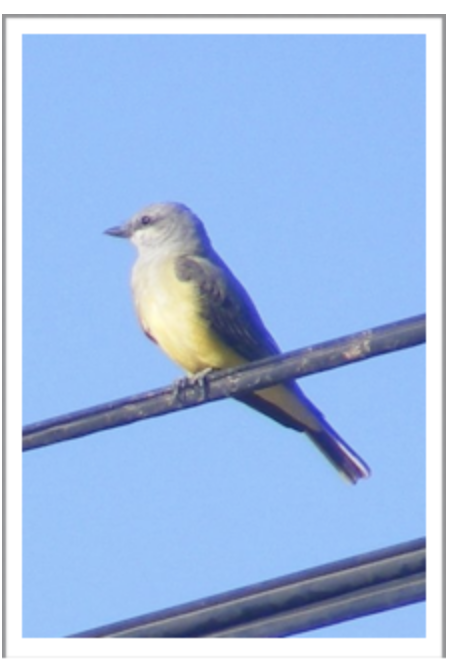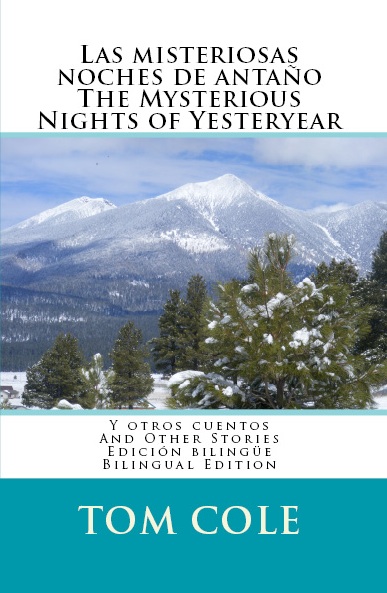|
23.
Las
misteriosas noches de antaño
(Scroll
down for English)
I
put this in on June
30, 2016
Hace algunos años yo
tenía la costumbre de
dormir cada noche afuera
en mi patio. Dormí allí
una vez y ya que en esos
días siempre dormía con
mi perra. Ella durmió
allí conmigo y la
próxima noche ella
quería dormir a la
intemperie otra vez. A
partir de entonces, ella
siempre insistía y por
eso yo dormía debajo de
las estrellas cada noche
por años.
Vivo en un barrio
tranquilo y no nos pasó
nada de mucho interés
allí en el patio salvo
lo que sucedió una noche
a las cuatro de la
mañana.
Algo
me despertó. Era el
canto de un pájaro.
Cantó una vez y luego yo
esperaba. Cantó de
nuevo.
—Sí,
claramente es un ave —me
dije a mí mismo.
Yo
esperaba nuevamente y el
pájaro cantó por tercera
vez. Nunca había oído un
canto semejante.
Escuchaba, pero el
pájaro no cantó más.
La
próxima noche antes del
amanecer el pájaro me
despertó otra vez con su
canto. No se asemejaba a
ningún canto que hasta
entonces hubiera
escuchado.
Sabía que los pájaros
cantan para comunicarse
no solamente con los
otros pájaros sino con
otros animales incluso
con seres humanos. Era
un canto de descaro y
audacia. Me parecía que
era casi un canto
imitativo del de un
pájaro, el canto de un
ave que quería
proclamar:
—Éste
sí que es un verdadero
canto. ¡Así canta un
pájaro de verdad!
Para
mí era casi un desafío.
Durante las noches
siguientes, antes de la
madrugada, el pájaro
cantaba puntualmente a
las cuatro y siempre
cantaba tres veces. El
canto era audaz,
atrevido. En efecto, una
vez cuando me había
despertado, sentí un
miedo repentino durante
los momentos soñolientos
entre el dormir y el
despertar y susurré con
un sobresalto:
—¡No
es pájaro!
Por
un momento tenía el
temor de que era alguna
clase de demonio que
había venido para
destriparme, un monstruo
que usaba el engaño de
un canto para
distraerme.
La locura pasó aunque
todavía me preguntaba,
“¿Será en realidad un
pájaro? ¿Y por qué canta
siempre a las cuatro y
siempre sólo tres
veces?”
El
canto tenía cuatro notas
— sílabas — y era
esdrújulo.
Una
noche traje un cable
eléctrico y una
grabadora al patio.
Esperaba. El pájaro no
cantó. La noche
siguiente, sin embargo,
tuve éxito. Tuve la
oportunidad de grabar
nada más un solo canto,
pero estaba bien
grabado. Se lo mostré a
mi hermano menor que
dijo:
—¡Difícil! Tal vez sea
una especie de curruca.
Entonces algo imprevisto
pasó. El pájaro cambió
su canto. Todavía tenía
las mismas cuatro notas
pero ahora el canto se
había vuelto agudo.
—¿Cambió su canto?
—preguntó mi hermano—.
Qué raro. ¿Por qué no
puedes levantarte para
verlo?
—¿Cómo verlo? Siempre
está de noche, tonto —le
dije.
Al
poco tiempo el pájaro
dejó de cantar, pero yo
empecé a investigar el
asunto y por fin logré
identificarlo. Yo tenía
un CD con grabaciones de
todos los pájaros del
oeste de Estados Unidos
y Canadá y como hay
cientos de especies en
esta región no era tarea
fácil localizar ese ave.
Un día, sin embargo, me
dije, “Tal vez sea una
clase de mosquero — un
tirano occidental.”
Acerté. Comparé el canto
que yo había grabado con
el canto del CD y no
cabía duda. Era él. El
canto era el canto
crepuscular del tirano.
Ya no
duermo en el patio y ya
no escucho el canto del
tirano porque
desgraciadamente se me
murió mi perra y ya no
tengo por qué dormir a
la intemperie.
He
descargado la grabación
del canto a mi
computadora y allí está,
un recuerdo de las
misteriosas noches de
antaño.
23.
The
Mysterious Nights of
Yesteryear
A few
years ago, I had the
habit of sleeping out
each night in my back
yard. I slept there
once, and since in those
days I always slept with
my dog, she slept there
with me, and the next
night she wanted to
sleep out again. From
then on, she always
insisted, and therefore
I slept under the stars
every night for years.
I
live in a pretty quiet
neighborhood and nothing
of much interest took
place there in the back
yard except for what
happened one night at
four in the morning.
Something woke me
up. It was the call of a
bird. It called once,
and then I waited. It
called again.
“Yes,
it's clearly a bird,” I
said to myself.
I
waited once more and the
bird called for the
third time. I had never
heard a call like that.
I listened, but the bird
didn't sing again.
The
next night before dawn,
the bird woke me again
with its call. It was
not like any call I had
ever heard.
I
knew that birds sang to
communicate not just
with other birds but
with other animals
including human beings.
It was a call of
brazenness and boldness.
It seemed to be almost a
characterization of a
bird call, the call of a
bird that wished to
proclaim, “This is a
real call. This is the
way a real bird sings!”
For
me it was almost a
challenge. During the
nights that followed,
before daylight, the
bird called punctually
at four and it always
called three times. The
call was intrepid and
daring. In fact, once
when I had awakened, I
felt a sudden fear
during the drowsy
moments between sleeping
and waking, and I
whispered with a start,
“It's not a bird!”
For a
moment I had the fear
that it was some kind of
demon that had come to
disembowel me, a monster
that was using the
trickery of a song to
distract me.
The
madness passed although
I still asked myself,
“Could it really be a
bird? And why does it
always sing at four
o’clock and always only
three times?”
The
call had four notes, and
its stress fell on the
antepenultimate note.
One
night I took an electric
cord and a tape recorder
to the back yard. I
waited. The bird didn’t
sing. The next night,
however, I had success.
I was only able to
record a single call,
but it could be clearly
heard on playback. I
showed it to my younger
brother who said,
“Difficult! Maybe it’s
some kind of warbler.”
Then
something unexpected
happened. The bird
changed its call. It
still had the same four
notes, but now the song
carried the stress on
the last note.
“It
changed its call?” my
brother asked. “That’s
weird. Why can’t you get
up to see it?”
“What
do you mean ‘see it?’
It’s nighttime, you
dope.”
A
little later, the bird
stopped singing, but I
began to investigate the
matter and at last was
able to identify it. I
had a CD with recordings
of all the western birds
of the United States and
Canada, and since there
were hundreds of species
in that region it wasn’t
an easy matter to find
that bird. One day,
however, I said to
myself, “Maybe it’s some
kind of flycatcher—a
western kingbird.”
I was
right. I compared the
song that I had recorded
with the one on the CD
and there was no doubt.
It was him. The call was
the dawn call of the
kingbird.
I
don’t sleep in the back
yard anymore, and I no
longer hear the call of
the kingbird because
unfortunately my dog
died, and I don’t have
any reason to sleep out
anymore.
I
have downloaded the call
on my computer, and
there it remains, a
remembrance of the
mysterious nights of
yesteryear.
|


